Price remains constrained and moving sideways. Volume suggests the breakout direction.
Summary: In the short term, price may move a little lower tomorrow. A small flag pattern may be completing. Volume suggests the breakout is more likely to be upwards. The measured rule gives a target about 2,459. The Elliott wave analysis gives a target about 2,469. Support continues to hold about 2,380.
If the last gap is closed with a new low below 2,376, then it would be an exhaustion gap. If that happens, then expect price to move substantially lower to make at least a slight new low below 2,328.95.
Always remember my two Golden Rules for trading:
1. Always use a stop.
2. Invest only 1-5% of equity on any one trade.
New updates to this analysis are in bold.
Last monthly and weekly charts are here. Last historic analysis video is here.
MAIN ELLIOTT WAVE COUNT
WEEKLY CHART
This wave count sees the middle of primary wave 3 a stretched out extension, which is the most typical scenario for this market.
Primary wave 3 may be incomplete. A target is now calculated for it on the daily chart.
There is alternation within primary wave 3 impulse, between the double zigzag of intermediate wave (2) and the possible triangle or combination of intermediate wave (4).
When primary wave 3 is a complete impulse, then a large correction would be expected for primary wave 4. This may be shallow.
Thereafter, primary wave 5 may be expected to be relatively short, ending about the final target at 2,500.
DAILY CHART
Primary wave (4) may be a complete regular contracting triangle. It may have come to a surprisingly swift end with a very brief E wave.
There is already a Fibonacci ratio between intermediate waves (3) and (1). This makes it a little less likely that intermediate wave (5) will exhibit a Fibonacci ratio to either of intermediate waves (1) or (3); the S&P often exhibits a Fibonacci ratio between two of its three actionary waves but does not between all three.
Within intermediate wave (5), no second wave correction may move beyond the start of its first wave below 2,344.51.
HOURLY CHART
The triangle may have come to a surprisingly quick end. Triangles normally take their time, so this quick end does slightly reduce the probability of this first wave count. A rare running flat within minor wave D of the triangle also slightly reduces the probability. For these reasons an alternate is provided below.
If the triangle is over, then the next wave up has begun. A five up may be complete.
The upwards movement for today’s session, labelled minuette wave (b), will not fit as a five wave structure on the five minute chart, but it will fit as a three. Minor wave 2 may be incomplete and may continue sideways for another one to three sessions. It is still labelled as a combination: zigzag – x – flat. The second structure, a flat correction, may be incomplete.
The purpose of combinations is to move price sideways and take up time. Only sideways movement would be expected if this structure is correctly labelled; the measuring gap should continue to provide support.
If the last gap is correctly named as a measuring gap, then it may not be filled; the lower edge may provide support. If this is the case, then minor wave 2 may be a relatively shallow correction. Within a new trend for this market, the early second wave corrections are often surprisingly brief and shallow.
If price closes the gap, then use the 0.618 Fibonacci ratio as the next target for minor wave 2. However, this wave count may switch to an alternate and the alternate below may become the main wave count if the gap is closed.
Minor wave 2 may not move beyond the start of minor wave 1 below 2,344.51.
If price does make a new low below 2,344.51, then the alternate below shall be used.
ALTERNATE DAILY CHART
What if intermediate wave (4) was not a complete triangle but is still unfolding as a double combination?
Double combinations are very common structures. This would still provide perfect alternation in structure with the double zigzag of intermediate wave (2). Although double zigzags and double combinations are both labelled W-X-Y, they are very different structures and belong to different groups of corrections.
The purpose of combinations is the same as triangles, to take up time and move price sideways. Intermediate wave (2) lasted 58 days. So far intermediate wave (4) has lasted 45 days. If it continues for another two or three weeks, it would still have excellent proportion with intermediate wave (2).
Although this wave count actually has a better look than the main wave count, it does not have support from classic technical analysis. For this reason it will be published as an alternate with a lower probability.
ALTERNATE HOURLY CHART
The problem of the running flat within the main wave count is here resolved.
The second structure of the combination for the larger correction of intermediate wave (4) may be an expanded flat labelled minor wave Y. There is no rule regarding the maximum length of B waves within flats, but there is an Elliott wave convention that states when the potential B wave reaches twice the length of the A wave the idea of a flat should be discarded based upon a very low probability. That price point would be at 2,427.77.
The zigzag for minute wave b upwards may be incomplete. Sideways movement for the last five days is seen in exactly the same way now for both wave counts, as a double combination. This may be minuette wave (b) and may now be incomplete.
TECHNICAL ANALYSIS
WEEKLY CHART
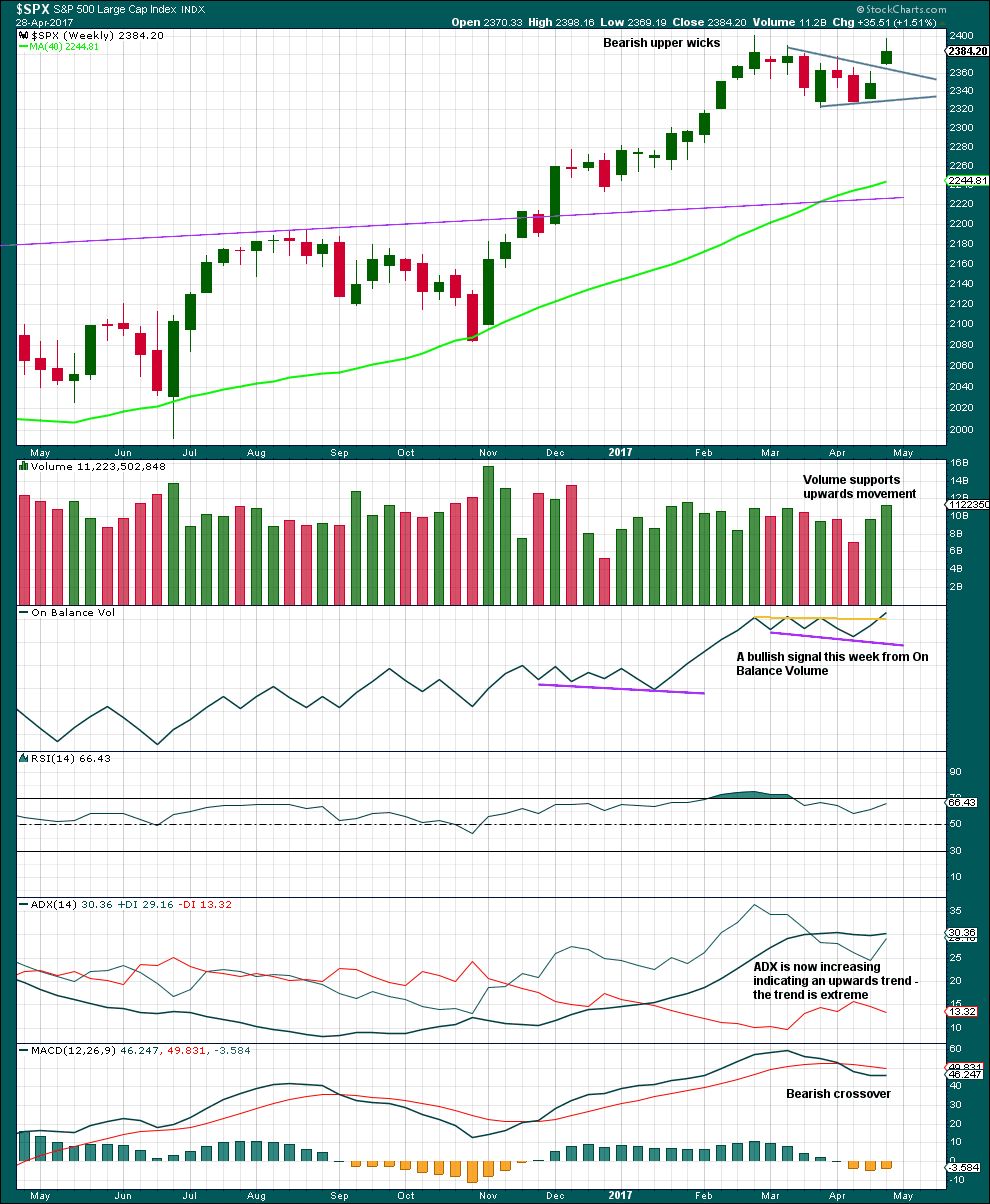
Click chart to enlarge. Chart courtesy of StockCharts.com.
This chart is bullish and strongly supports the main wave count. However, it is concerning that ADX is extreme. This does not mean price must turn down here; it only puts some doubt on how much further price can go up.
DAILY CHART
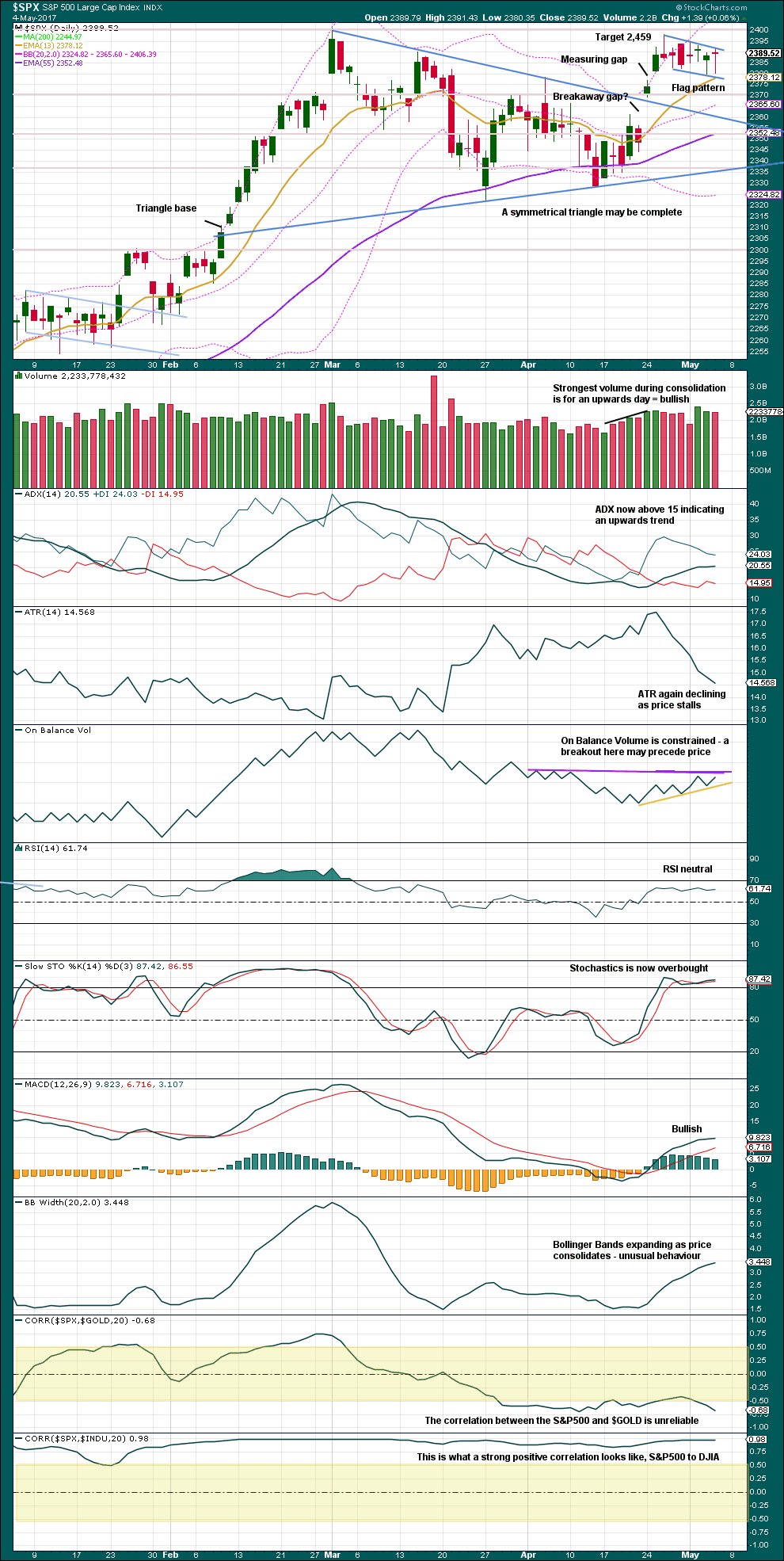
Click chart to enlarge. Chart courtesy of StockCharts.com.
So far the last gap labelled a measuring gap is holding support. Assume this gap is a measuring gap while it remains open, until proven otherwise.
Sideways movement for the last six sessions looks like a bull flag pattern, one of the most reliable continuation patterns. There are now at least two anchor points for the resistance and support lines, so these lines may now be drawn. The pattern has a downwards slope and that increases its effectiveness. However, volume is not declining as price moves sideways. This does not rule out a flag pattern, but it is nice to see consolidations supported by declining volume.
During the consolidation it is upwards days which have strongest volume, suggesting an upwards breakout is more likely than downwards.
The measured rule uses the start of the flag pole on the 13th of April to its end on the 26th of April. This length is applied to an approximate breakout point about 2,390 giving a target about 2,459.
A classic breakout would be an upwards day closing above the resistance line with an increase in volume.
During a trend Stochastics may remain extreme for long periods of time. Overbought Stochastics does not signal price must move down here. Only when Stochastics has remained extreme and then exhibits divergence with price, preferably multiple divergence, is it a strong warning of an impending trend change. That is not the case yet.
This classic analysis still offers more support for the main Elliott wave count than the alternate.
VOLATILITY – INVERTED VIX CHART
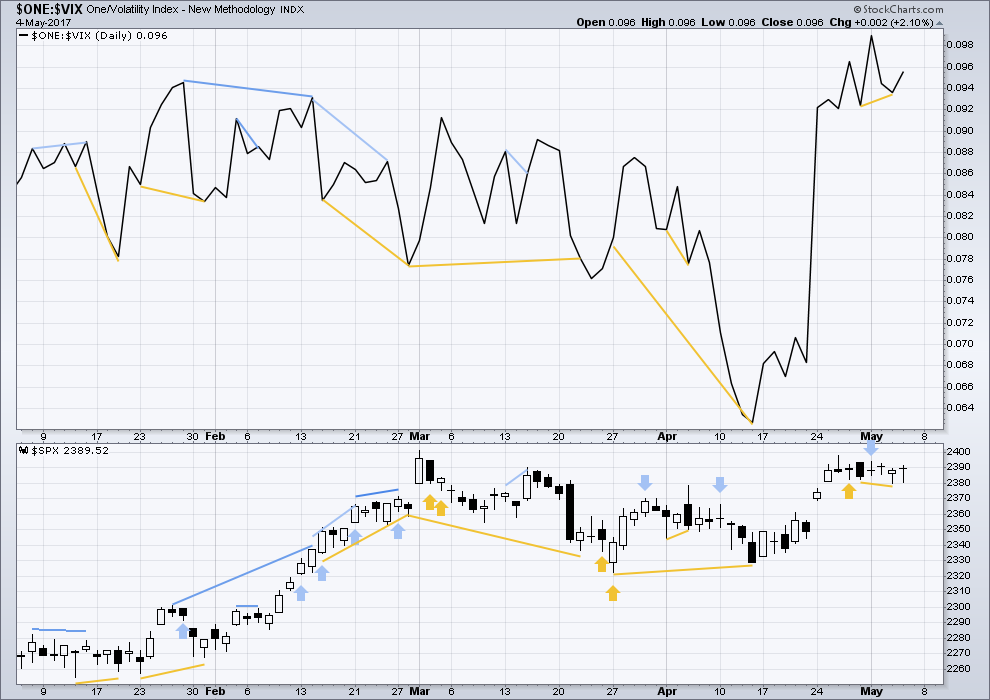
Click chart to enlarge. Chart courtesy of StockCharts.com.
Normally, volatility should decline as price moves higher and increase as price moves lower. This means that normally inverted VIX should move in the same direction as price.
It is noted that there are now six multi day instances of bullish divergence between price and inverted VIX, and all have been followed so far by at least one upwards day if not more. This signal seems to again be working more often than not. It will again be given some weight in analysis.
Weak short term bullish divergence between price and VIX has been followed by one upwards day. It may be followed by one more before it is resolved, or it may be resolved here.
BREADTH – AD LINE
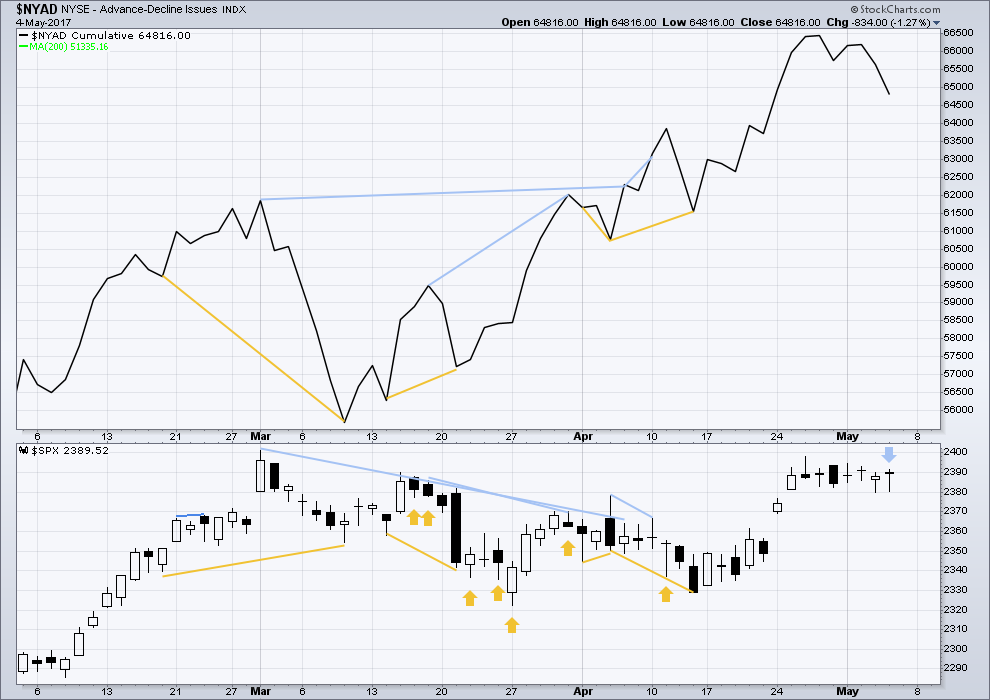
Click chart to enlarge. Chart courtesy of StockCharts.com.
Price today made a higher high and a higher low, the definition of upwards movement, but the AD line declined. The rise in price today was not supported by a corresponding rise in market breadth. This single day divergence is bearish and supports the Elliott wave count short term.
DOW THEORY
The DJIA, DJT, S&P500 and Nasdaq continue to make new all time highs. This confirms a bull market continues.
The following lows need to be exceeded for Dow Theory to confirm the end of the bull market and a change to a bear market:
DJIA: 17,883.56.
DJT: 7,029.41.
S&P500: 2,083.79.
Nasdaq: 5,034.41.
Charts showing each prior major swing low used for Dow Theory are here.
This analysis is published @ 12:01 a.m. EST on 5th May, 2017.

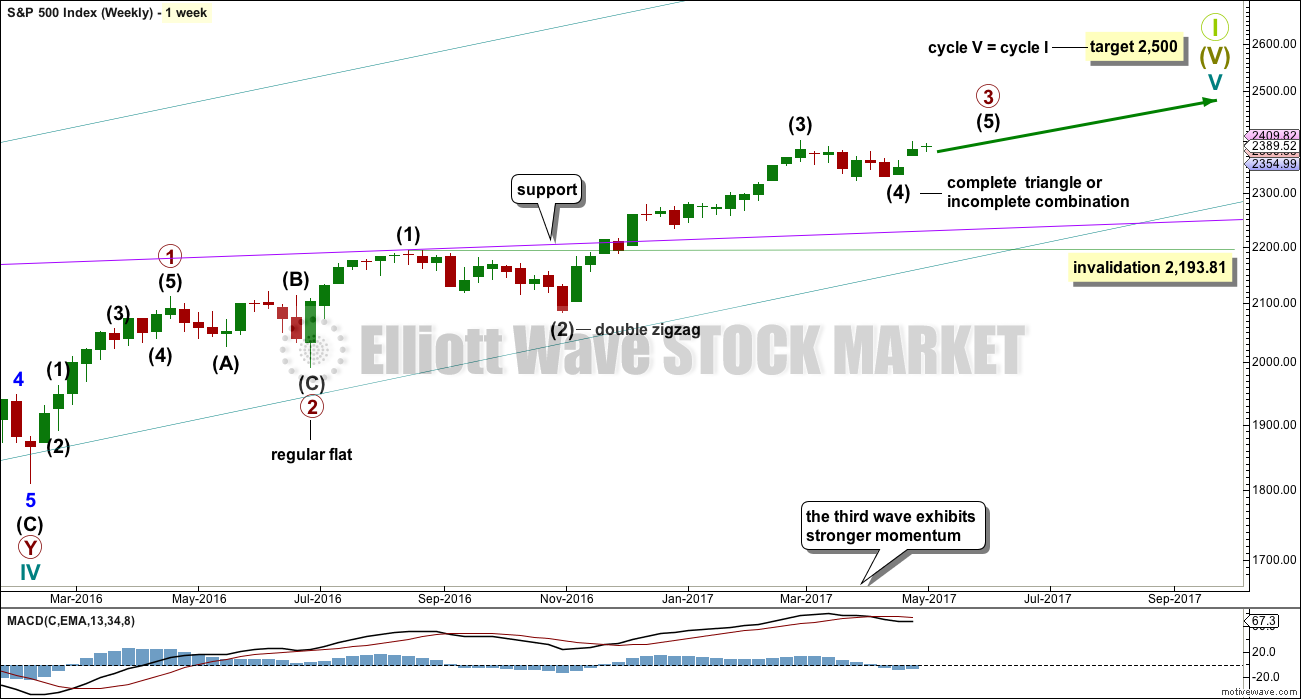
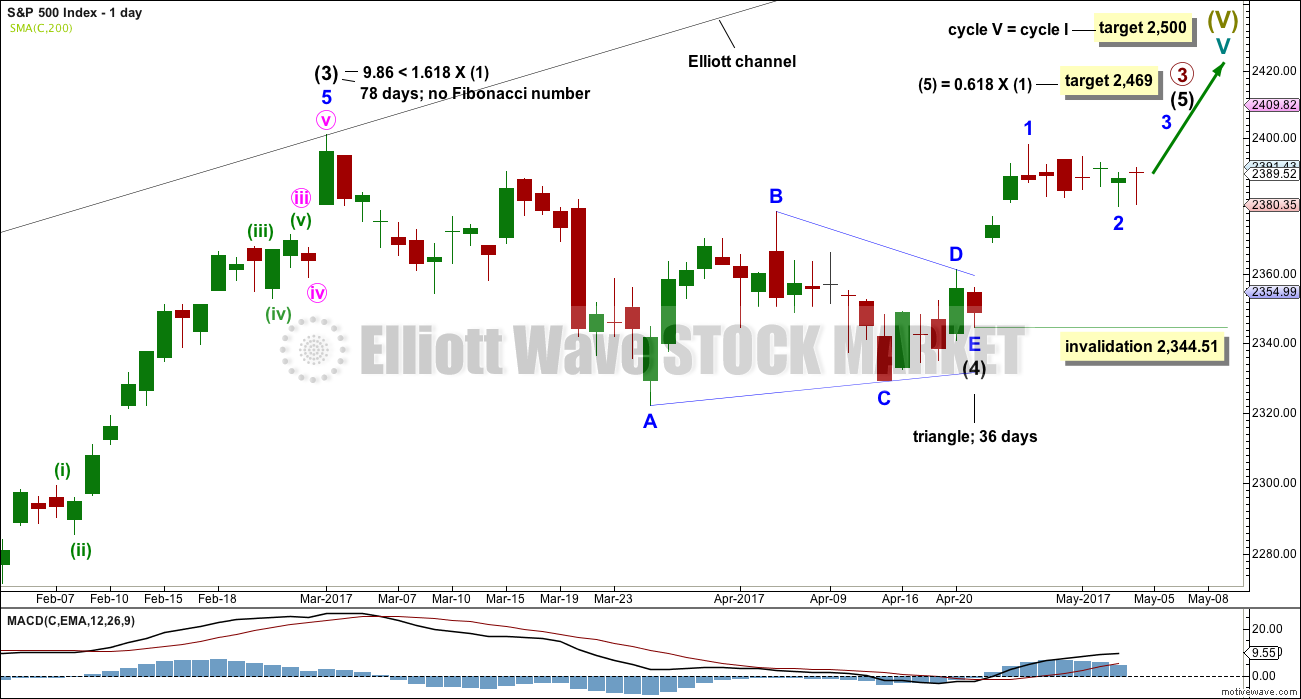
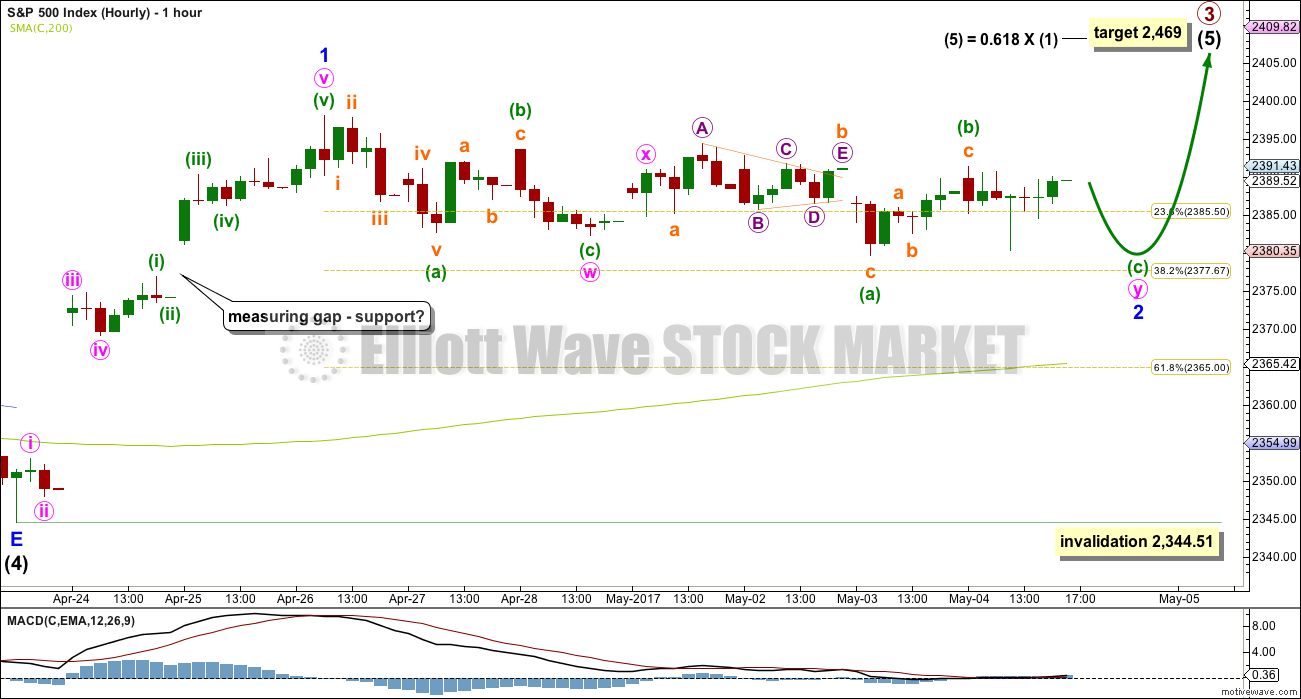
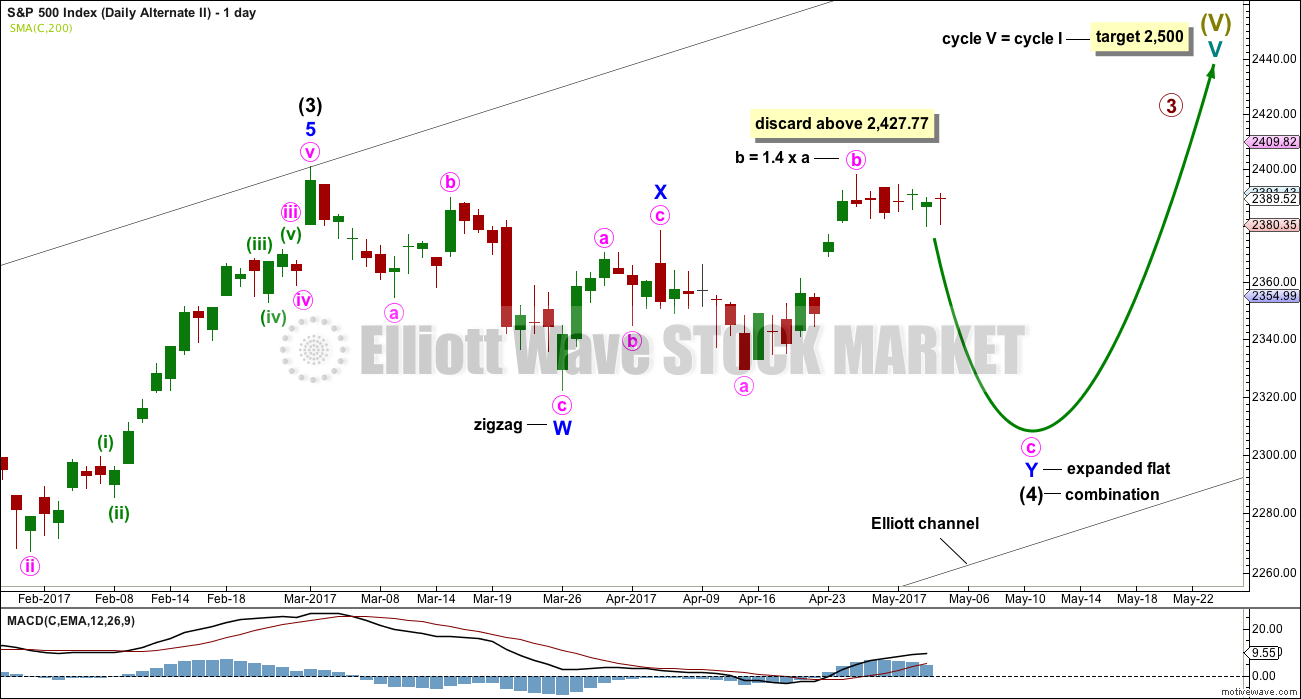
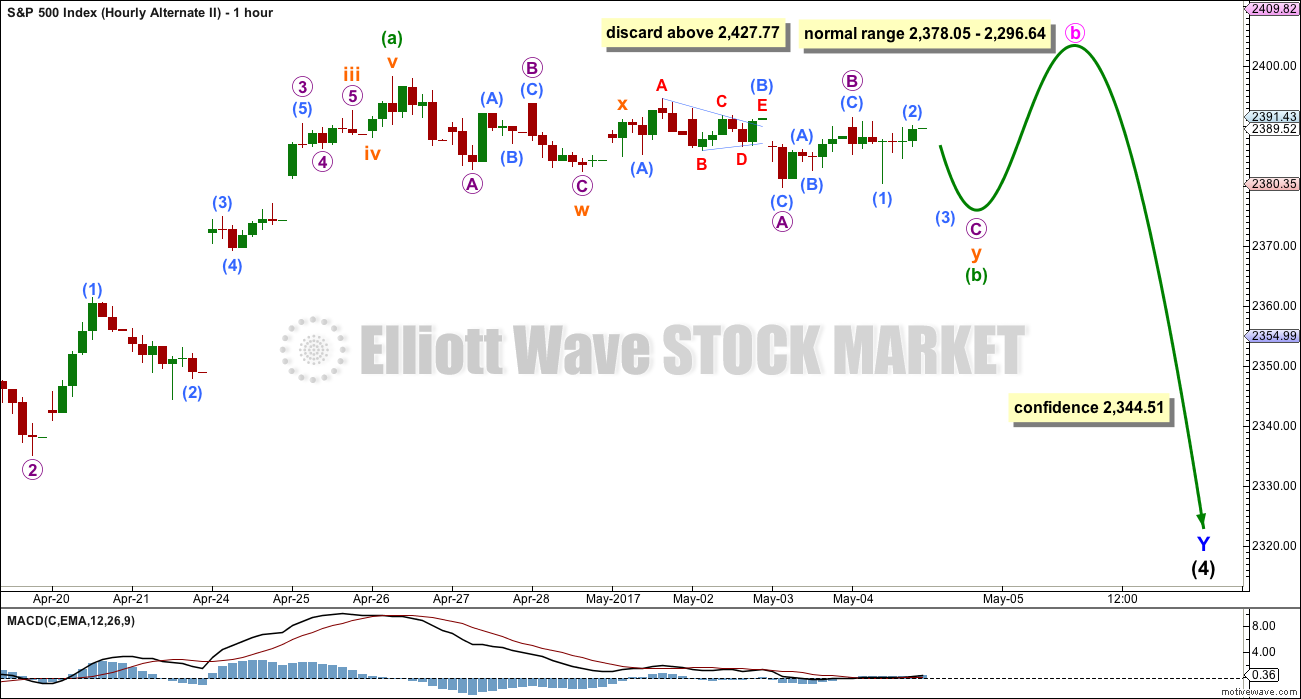
A-B-C of a zigzag (alternate) subdivides exactly the same as 1-2-3 of an impulse. Both subdivide 5-3-5.
It’s not until the impulse gets into what should be it’s fourth wave that we can know for sure which EW structure is unfolding.
Still, the main count has a lot of support from classic TA. Particularly volume.
Looks like minor 2 is over, the second structure may have been a triangle.
I don’t like it very much, that triangle. But so far I haven’t seen a better count.
Will work on it prior to publishing todays end of week analysis.
Is anyone else here bothered by the look of Intermediate Wave 3? It just doesn’t look like a 5 wave impulse to me. I think this will get resolved next week. If we head lower from here, I think we could be in Primary Wave 4.
That was initially my concern too Peter, originally I had it as seeing another correction in there.
But look at this on the monthly chart. It looks there like it should be labelled as intermediate (3).
This horrid market just doesn’t give nice looking EW structures always on all time frames.
I still have the alternate idea I’m charting, will use it again if it shows itself to be true.
Looks like it is going to be a boring day. It would seem they are all waiting for the French elections. Hit the beaches everybody! 🙂
Twice is nice. Twice in a row …. well that is just superb.
Nicely done Rodney. Nicely done 🙂